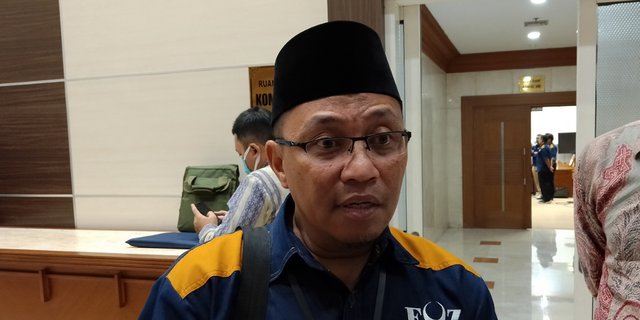Hilarious! This is What's Behind the Scenes of Floating Ghost Scenes in Soap Operas
The ghost moves smoothly without moving any part of its body.

Dream - The National Zakat Forum (FOZ), an association of zakat managers, presented an evaluation of the implementation of Zakat Management Law Number 23 of 2011 to the Commission VIII of the Indonesian Parliament. They assessed that the establishment of zakat amil institutions under the law is more complicated compared to the era of Law No.38/1999.
"Today, the licensing process does not comply with the decision of the Constitutional Court (PUU No. 86/PUU-X/2012) which at that time facilitated a judicial review of this zakat law," said Bambang after the Hearing with Commission VIII of the Parliament Building, Jakarta, Monday, April 10, 2023.
Bambang stated that the licensing process should be directly carried out by the Ministry of Religious Affairs (Kemenag), but currently it has to go through recommendations from the National Zakat Amil Agency (Baznas) with an uncertain waiting time. After this complicated process, they can finally obtain a permit from the Ministry of Religious Affairs.
"The problem arises when entering Baznas, the issuance of recommendations is not fixed. The rules state that it should take 14 days, but in reality, there are delays, even for years," said Bambang.
There are no administrative issues. However, according to Bambang, the indefiniteness of Baznas lies in making decisions regarding recommendations.
"In 2020, we (FOZ) invited the Ombudsman to review this reality. There are notes from the Ombudsman that there is a high possibility of a conflict of interest in issuing and not issuing permits," explained Bambang.
In his presentation to the Commission VIII of the Indonesian Parliament, Bambang explained that out of the 18 National Zakat Amil Institutions (LAZ) that existed during the era of Law No.38/1999, only 10 LAZ have survived and obtained permits as National LAZ in the era of Law No.23/2011.
"These 8 are directed to become Zakat Collection Units (UPZ)," he added.
The prolonged licensing process hampers broad participation of the community in zakat collection. The highlight for FOZ, according to Bambang, is the formation of a conducive zakat ecosystem.
"The highlight is the formation of a conducive zakat ecosystem. So, if the licensing process is fixed, standardized, or clear, the focus will be on programs, zakat benefits, regulatory strength, and others," said Bambang.
Another evaluation by FOZ is regarding the collection of funds from the community through the 70:30 scheme for institutions designated as UPZ. In this scheme, 100% of the funds collected by UPZ are handed over to Baznas, and then 70% is returned to UPZ.
"The remaining 30% is fully managed by Baznas. UPZ is not entitled to receive reports because it is considered UPZ," said Bambang.
Bambang continued, when a zakat institution is granted a permit, 100% of the management should be under that institution.
Then the institution must be able to be accountable for it, with regular audits, public exposure to the community, and access for public questions. However, the context of the 30% report that the institution cannot answer is because the report is with Baznas.
"There is always a demand for Baznas to provide reports, but Baznas says it is not regulated anywhere, so Baznas feels not obligated to report. Maybe it is in Baznas' report directly but not included in the reports of the UPZ, while the muzakki agreement is with the UPZ," he said.
Cobain For You Page (FYP) Yang kamu suka ada di sini,
lihat isinya
The ghost moves smoothly without moving any part of its body.
Their marriage attracted public attention, and many sent their congratulations on their decision to have a serious relationship.
Based on its design, it can be assumed that the apartment owner has created a partition and transformed a small space on the balcony into a bedroom.
A bit different, this cow takes a nap inside a room.
During the month of Ramadan, pay attention to these matters so that the worship performed during this holy month is not in vain.
J&J knew about tests showing its powder contained carcinogenic asbestos, but kept the information secret.
David, who is still lying down, smiles when allowed to touch Adam Suseno's mustache, Inul Daratista's husband.
Here is the iftar schedule for Monday, April 10, 2023
In written confirmation, Head of Public Relations Section of Customs, Sudiro, said that what happened to Yuni was a scam that used the name of Customs, which has often occurred.
He sent another photo of someone wearing a TNI uniform, as if to show his identity.
AG was found guilty and sentenced to 3.5 years in prison at LPKA.
Instead of being scary, the woman wearing the pocong costume in broad daylight actually looks cute.